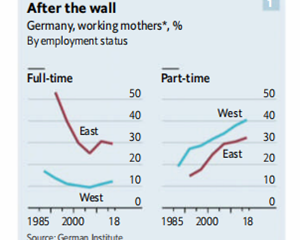Policy seems to play a powerful role in explaining the collapse in full-time employment in the east. Despite some recent changes, the policies of unified Germany, like those of the FRG, still assume that women are wives and mothers first. Joint taxation of married couples, free co-insurance for spouses and tax breaks for "mini jobs", or low-hours contracts, probably did little to encourage women in the west to up their hours, and put those in the east off full-time work.
“政策”似乎在解釋東德全職就業人數下降方面發揮了重要作用。盡管最近發生了一些變化,但統一后的德國和德國聯邦政府的政策一樣,仍然假設女性首先應該是妻子和母親。對已婚夫婦的聯合征稅、對配偶的免費共同保險、以及對“迷你工作”或低工時合同的稅收減免,可能對鼓勵西德婦女延長工作時間并使東德婦女放棄全職工作沒有什么幫助。
Attitudes, meanwhile, may help explain part of the lasting hours gap between east and west: 30 years after unification, eastern women are still more likely to approve of full-time working mums. This chimes with earlier findings that east Germans are more likely to have an egalitarian view of the roles of the sexes.
與此同時,“態度”可能是解釋東西德之間長期存在工作時長差距的部分原因:在統一30年之后,東德女性仍然更傾向于認可全職媽媽。這與早期的發現相一致,即東德人可能更傾向于用平等的眼光看待性別角色。

Attitudes have also changed over time, though. Strikingly, women born after 1975 in both the east and west are more likely to disapprove of mothers in full-time work than older ones, putting paid to the idea that younger women are keener on work. Perhaps women's views are shaped by the policies they face. Katharina Wrohlich, one of the report's authors, also suspects that the shift marks a rejection by younger women of both the dual-earner model of the GDR and the single-earner model of the FRG. "Instead the younger generation seems to be aspiring to the one-and-a-half jobs model," she says—a preference that policy may need to respond to in turn.
不過,隨著時間的推移,人們的態度也發生了變化。值得注意的是,不管是在東德還是西德,1975之后出生的女性比年長的女性更有可能否認全職媽媽,這推翻了年輕女性更熱衷于工作的觀點,或許女性的觀點是由她們所面臨的政策決定的。凱瑟琳·若珂是該報告的作者之一,她也懷疑這種轉變標志著年輕女性對德意志民主共和國的雙職工模式和德意志聯邦共和國的單職工模式的排斥。她說:“相反,年輕一代似乎熱衷于半工作模式。”這一偏好可能需要相應的政策予以回應。
The unification "experiment" hardly took place in laboratory conditions. Many women migrated from east to west. The regions differ in many other respects—incomes per head are lower in the east, for instance—that also affect the number of hours women work. But the episode still says something about the power of policy and the endurance of attitudes, long after walls are torn down.
這場統一“實驗”的基地并不是在實驗室。其中也有許多從東德遷移到西德的女性。這些地區在其他許多方面也存在差異——例如,東德地區的人均收入較低——這也影響了女性的工作時長。不過,即便高墻已倒,這段插曲仍彰顯了政策的力量和態度的耐力。
譯文由可可原創,僅供學習交流使用,未經許可請勿轉載。











